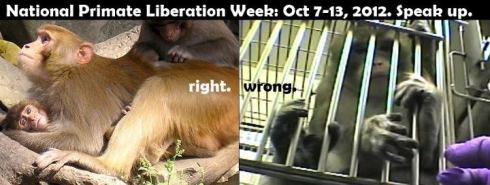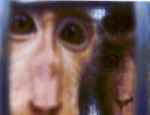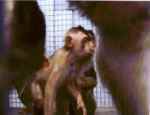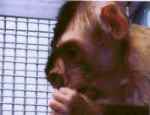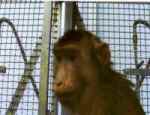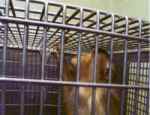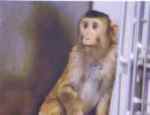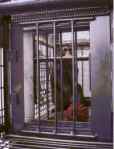
Stop Animal Exploitation Now (SAEN), a national organization that monitors animal laboratories, has recently released information contained in documents and photos that were obtained from the University of Washington, Seattle. These photos and documents paint a vivid picture of the harsh reality daily inflicted on primates within this lab without even delving into gruesome experimental procedures. Barren captivity, severe illnesses, and staff incompetence exact a heavy toll on these primates.
The bungling staff of UW is incapable of even doing simple things like making sure the primates are actually in their enclosures. Within sixteen months, seven primates escaped from their enclosures, injuring either themselves or other primates in the process. How many more primate escapes went undocumented?

According to UW primate health care records, many other animals were negligently injured. On 2/27/11 Primate J97270 was injured because “AT reported injury to animal. Animal grabbed scissors from AT” (AT may mean Animal Technician). On 4/5/11 Primate K11027, an infant experiencing thermoregulation issues, is listed with “what looks to be burn trauma of the D5 of the left foot” after an external heat treatment.
Unfortunately, this insanity doesn’t stop here — UW documents are riddled with many more episodes of ineptitude. On 1/20/11 Primate A07005 was not properly prepped for surgery: “Veterinarian cancelled surgery as the animal appears to have had access to food. . . . Animal vomited large quantity of partially digested food and extubated itself.” On 4/14/10 a botched surgical procedure occurred when a “1mm probe inadvertently penetrated brain tissue.” Primate R08004 was simply found dead with “severe edema and swelling of head . . . Ingesta present in mouth and a few drops of blood noted on nose.” Primate A07121 was euthanized because “During a routine blood draw, it was discovered that the animal had a fractured right femur.” Apparently, the incompetent UW staff had failed to even notice a major broken bone.
Non-procedural injuries at UW are rampant, too. In 2010, two traumatic incidents led to the amputation of eight inches from the tails of two UW primates. On 4/3/11 the tips of several fingers on the left hand of Primate A06077 were avulsed (forcibly detached) exposing bone. Primate K03150 is listed with two lacerations, a 5 cm injury and an older 10 cm injury. By no means are these the only animals with traumatic injuries; the full list would roll on for several pages.

Not only does UW staff regularly violate federal animal welfare law, they also regularly violate their own internal animal care policy. Illnesses frequently cause weight loss, but major weight loss indicates severe suffering and should never be allowed. UW’s policy regarding “Permissible Weight Loss” states: “The upper limit of acceptable weight loss in animals on experimental regimens shall be 20%.” A 20% weight loss is excessive – comparable to a 150 pound human losing 30 pounds. In violation of UW’s own policy, Primate J04245 lost “over 25%” of his body weight. Similarly, Primate A06014 also had a major loss of weight: “The animal has had a dermatological condition intermittently since ’07. Recently, there has been a >20% body weight loss, and the dermatologic condition has been recurring.” Primate A02006 also experienced major weight loss noted as “The animal eventually developed >25% body weight loss . . . .” Primate 01134 suffered “approximately 30% weight loss” – now our 150 pound person is up to a 45 pound weight loss! Primate 04044 is only noted as enduring a “profound weight loss” – one can only imagine what percentage profound means. A human, or a primate, who losses this much weight would look like a walking skeleton, like a concentration camp victim.

All of these incidents of negligence and trauma paint a grueling picture that is almost too bizarre to be believed, if it weren’t based on the UW’s own records! Primates regularly escape from their enclosures. They are allowed access to scissors. Traumatic injuries requiring amputation of major body parts are common. And many primates are allowed to become so severely emaciated that they resemble walking skeletons.
Take Action Against the University of Washington:
1. Contact Dr. Robert Gibbens to demand immediate action against the University of Washington, Seattle. The criminal acts of this lab must be severely punished!
Dr. Robert Gibbens
Director, Western Region
USDA/APHIS/A
2150 Center Ave
Building B, Mailstop 3W11
Fort Collins, CO 80526-8117
(970) 494-7478
Robert.M.Gibbens@usda.gov
2. Contact the President of the University of Washington, Michael K. Young, to demand that all abuse of primates at this criminal lab be terminated immediately.
Michael K. Young
Office of the President
University of Washington
301 Gerberding Hall
Box 351230
Seattle, WA 98195
(206) 543-5010
pres@u.washington.edu
3. Support the campaigns by local groups to end the abuse of animals in labs in this area, such as the Northwest Animal Rights Organization, Seattle Animal Defense League, and Action for Animals.

